Intro
Optimize thyroid treatment with 5 expert tips on thyroid medication, including dosage, timing, and interactions, to manage hypothyroidism symptoms and improve overall thyroid health and wellness.
Thyroid medication has become an essential part of managing thyroid disorders for millions of people worldwide. The thyroid gland plays a crucial role in regulating metabolism, energy levels, and overall health. However, when the thyroid gland is not functioning properly, it can lead to a range of symptoms, including fatigue, weight gain, and mood changes. Thyroid medication can help alleviate these symptoms and restore normal thyroid function. In this article, we will explore five tips for taking thyroid medication effectively.
Thyroid medication is typically prescribed to treat hypothyroidism, a condition where the thyroid gland does not produce enough thyroid hormones. The most common type of thyroid medication is levothyroxine, which is a synthetic form of the thyroid hormone thyroxine (T4). Levothyroxine works by replacing the missing thyroid hormones in the body, helping to regulate metabolism and relieve symptoms. While thyroid medication can be highly effective, it's essential to take it correctly to get the most out of treatment.
The importance of taking thyroid medication as directed cannot be overstated. Thyroid hormones are delicate, and even small changes in dosage or timing can affect treatment outcomes. Moreover, thyroid medication can interact with other medications, foods, and supplements, which can impact its efficacy. By understanding how to take thyroid medication effectively, individuals can better manage their thyroid condition and improve their overall health.
Understanding Thyroid Medication
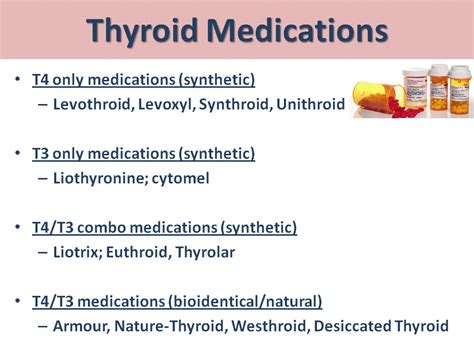
To get the most out of thyroid medication, it's crucial to understand how it works and how to take it correctly. Thyroid medication is typically taken orally, once a day, on an empty stomach. It's essential to take the medication at the same time every day to maintain consistent hormone levels. Additionally, individuals should avoid taking thyroid medication with certain foods or supplements, such as calcium or iron, which can interfere with absorption.
Tip 1: Take Thyroid Medication on an Empty Stomach
Taking thyroid medication on an empty stomach can help improve absorption and reduce the risk of interactions with food. It's recommended to take the medication first thing in the morning, at least 30 minutes before eating or drinking anything. This allows the medication to be absorbed into the bloodstream quickly and efficiently. Furthermore, taking thyroid medication on an empty stomach can help minimize side effects, such as nausea or stomach upset.Thyroid Medication Interactions
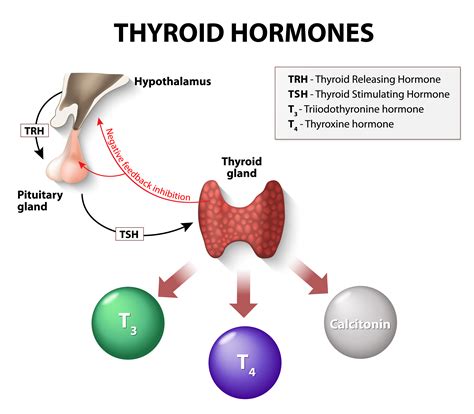
Thyroid medication can interact with a range of substances, including medications, foods, and supplements. Certain medications, such as blood thinners or antidepressants, can affect thyroid hormone levels or interact with thyroid medication. Foods high in fiber, such as bran or soy, can also interfere with thyroid medication absorption. Additionally, supplements like calcium or iron can bind to thyroid medication, reducing its efficacy. By understanding potential interactions, individuals can take steps to minimize risks and ensure effective treatment.
Tip 2: Be Aware of Potential Interactions
Being aware of potential interactions is crucial for safe and effective thyroid medication use. Individuals should inform their doctor about all medications, supplements, and foods they consume, including vitamins, minerals, and herbal remedies. This information can help healthcare providers identify potential interactions and adjust treatment plans accordingly. Moreover, individuals should monitor their thyroid hormone levels regularly to ensure that interactions are not affecting treatment outcomes.Monitoring Thyroid Hormone Levels
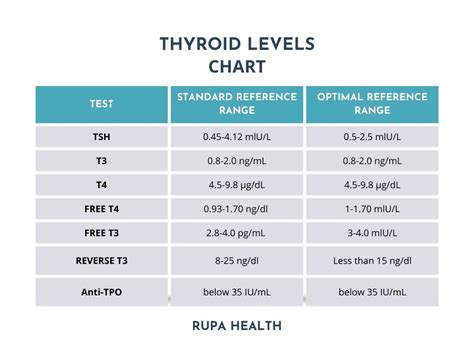
Regular monitoring of thyroid hormone levels is essential for effective treatment. Thyroid hormone levels can fluctuate over time, and adjustments to medication dosage may be necessary. Individuals should work closely with their healthcare provider to monitor their thyroid hormone levels and adjust treatment plans as needed. This may involve regular blood tests, physical exams, and symptom assessments.
Tip 3: Monitor Thyroid Hormone Levels Regularly
Monitoring thyroid hormone levels regularly can help individuals stay on top of their treatment and make adjustments as needed. This may involve working with a healthcare provider to schedule regular blood tests and check-ups. Additionally, individuals can keep track of their symptoms and report any changes to their healthcare provider. By monitoring thyroid hormone levels and symptoms, individuals can ensure that their treatment plan is working effectively and make adjustments to optimize outcomes.Thyroid Medication Dosage and Timing
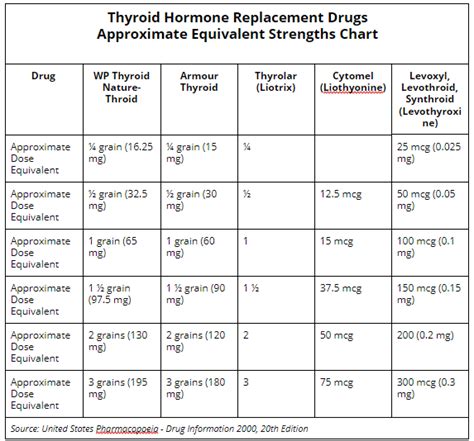
Thyroid medication dosage and timing are critical for effective treatment. The dosage and timing of thyroid medication can affect how well the medication works and how quickly symptoms improve. Individuals should work closely with their healthcare provider to determine the optimal dosage and timing for their specific needs. This may involve adjusting the dosage or timing of medication based on thyroid hormone levels, symptoms, and other factors.
Tip 4: Take Thyroid Medication at the Same Time Every Day
Taking thyroid medication at the same time every day can help maintain consistent hormone levels and reduce the risk of side effects. Individuals should choose a specific time of day that works for them and stick to it, taking the medication at the same time every day. This can help regulate the body's internal clock and improve the effectiveness of treatment.Thyroid Medication Side Effects

Thyroid medication can cause side effects, particularly when first starting treatment. Common side effects include nausea, stomach upset, and changes in appetite or weight. However, these side effects are usually mild and temporary, resolving on their own within a few weeks. In some cases, side effects can be more severe, requiring medical attention.
Tip 5: Report Side Effects to Your Healthcare Provider
Reporting side effects to a healthcare provider is essential for safe and effective treatment. Individuals should inform their healthcare provider about any side effects they experience, no matter how mild or severe. This information can help healthcare providers adjust treatment plans and minimize the risk of complications. Additionally, individuals can work with their healthcare provider to develop strategies for managing side effects and improving overall treatment outcomes.Conclusion and Next Steps
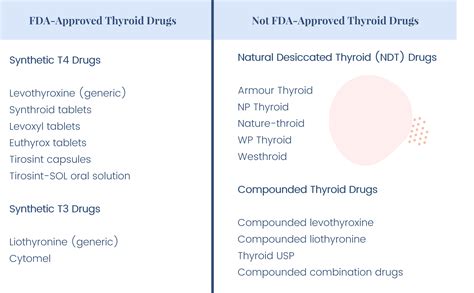
In conclusion, taking thyroid medication effectively requires careful attention to dosage, timing, and potential interactions. By following these five tips, individuals can optimize their treatment outcomes and improve their overall health. It's essential to work closely with a healthcare provider to monitor thyroid hormone levels, adjust treatment plans as needed, and manage side effects. By taking a proactive and informed approach to thyroid medication, individuals can take control of their thyroid health and improve their quality of life.
We invite you to share your thoughts and experiences with thyroid medication in the comments below. Have you found any tips or strategies that have helped you manage your thyroid condition? Do you have any questions or concerns about thyroid medication? Share your story and help others who may be going through similar experiences.
What is the most common type of thyroid medication?
+The most common type of thyroid medication is levothyroxine, which is a synthetic form of the thyroid hormone thyroxine (T4).
How often should I take thyroid medication?
+Thyroid medication is typically taken once a day, on an empty stomach, at the same time every day.
Can I take thyroid medication with other medications?
+It's essential to inform your healthcare provider about all medications, supplements, and foods you consume, as some may interact with thyroid medication.
How long does it take for thyroid medication to start working?
+Thyroid medication can start working within a few weeks, but it may take several months to reach full effectiveness.
What are the common side effects of thyroid medication?
+Common side effects of thyroid medication include nausea, stomach upset, and changes in appetite or weight.
